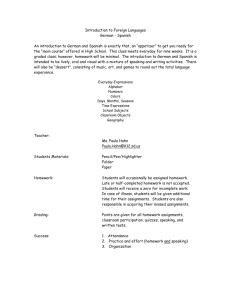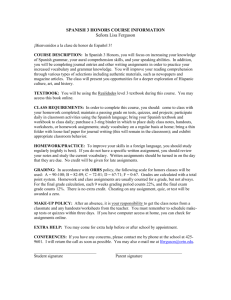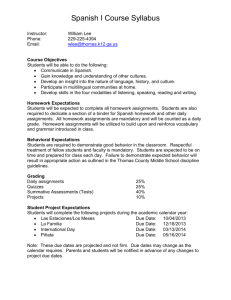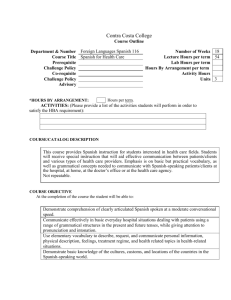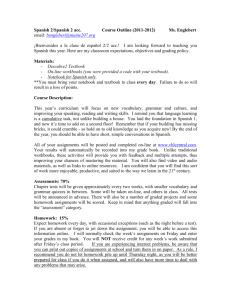SPANISH 201: INTERMEDIATE SPANISH
advertisement
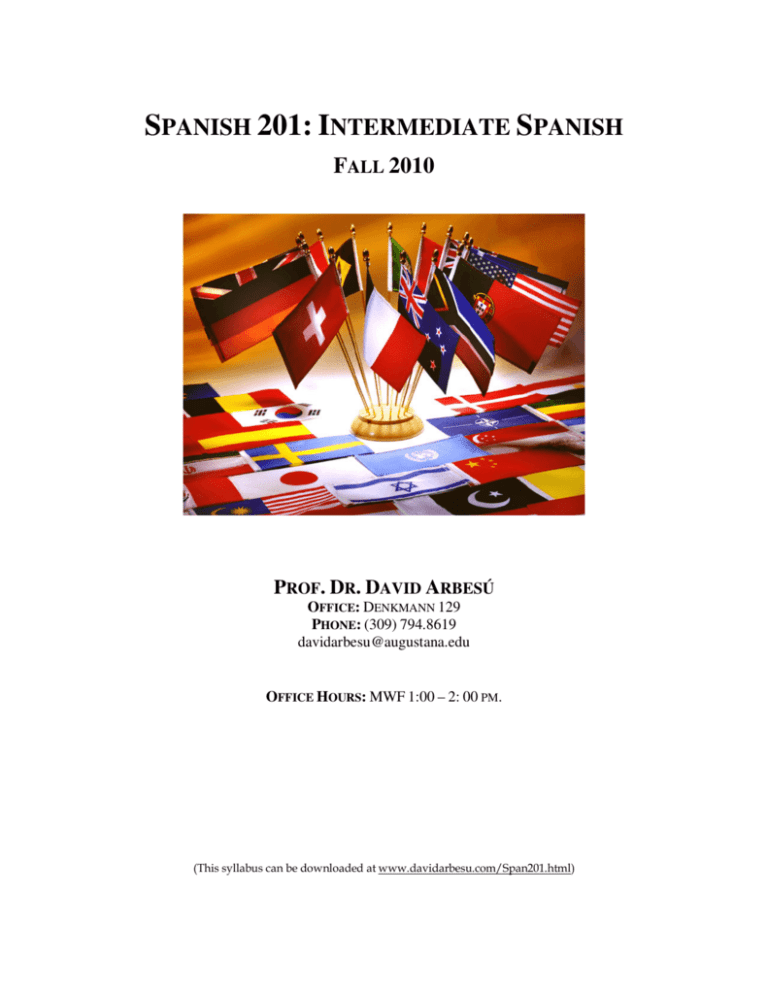
SPANISH 201: INTERMEDIATE SPANISH FALL 2010 PROF. DR. DAVID ARBESÚ OFFICE: DENKMANN 129 PHONE: (309) 794.8619 davidarbesu@augustana.edu OFFICE HOURS: MWF 1:00 – 2: 00 PM. (This syllabus can be downloaded at www.davidarbesu.com/Span201.html) COURSE DESCRIPTION AND OBJECTIVES: Spanish 201 is the first of three Intermediate Spanish courses at Augustana. The course is designed to expand vocabulary, reinforce and review major grammatical points, refine listening skills and improve reading and writing skills. In-class activities will focus on communication skills, grammar review, vocabulary usage, and reading comprehension. Homework assignments include grammar practice, vocabulary building exercises and readings. In this course you will continue working to develop your ability to communicate satisfactorily in Spanish in everyday practical situations and you will acquire some of the skills necessary for effective reading and writing in a second language. Students will be expected to use Spanish exclusively in class and to express themselves effectively in writing. In addition, students will read and discuss culturally-relevant Spanishlanguage materials. The course requires regular classroom participation and 1 hour of home studying (listening, writing, reading, culture, grammar study) for every hour of class. Tips for success: • Study 5 hours per week outside of class • Take notes and ask questions • Practice daily • Form/join a study group • Avoid translating • Speak Spanish! Don’t be afraid to make mistakes → NO USE OF ENGLISH IN THE CLASSROOM IS ALLOWED. THE PROFESSOR IS THE ONLY ONE WHO WILL USE ENGLISH OCCASIONALLY FOR GRAMMATICAL EXPLANATIONS. → YOU ARE ENCOURAGED TO USE THE RESOURCES AVAILABLE THROUGH THE SPANISH DEPARTMENT: TERTULIAS, THE SPANISH WRITING CENTER, AND / OR TUTORS. HOWEVER, HELP FROM TUTORS IS STRICTLY PROHIBITED FOR GRADED ASSIGNMENTS. YOU CAN GET HELP FOR YOUR HOMEWORK (CORRECTED IN CLASS), BUT NEVER FOR A WRITING ASSIGNMENT. TEXTBOOK: VENTANAS (LENGUA): CURSO INTERMEDIO DE LENGUA ESPAÑOLA. JOSÉ A. BLANCO & MARÍA COLBERT. BOSTON, MA: VISTA HIGHER LEARNING, 2009. ASSESSMENT: A+ A AB+ B B- 97-100 93-97 90-93 87-90 83-87 80-83 C+ C CD F 77-80 73-77 70-73 65-70 65 AND BELOW. 2 COMPONENTS: Chapter Exams Writing Assignments Final Exam Participation Group Sketch Homework & Quizzes 20% 20% 15% 15% (coming to class is not participation, it is your responsibility). 15% 15% Participation: Includes attendance, preparation for and participation in class, timely completion of homework, etc. Class participation is always expected and extremely welcomed. Please notice that participating in class does not mean getting all the answers right or speaking proper Spanish, but rather TRYING to do so. A student who participates often and, say, gets “all answers wrong” will get exactly the same credit as a student who participates and gets all answers right (i.e. full participation credit). As a reminder, this grade is given twice: at the middle, and at the end of the term, and it really makes a difference in the final percentage. Do not procrastinate participation! Attendance and Punctuality: As SPAN 201 is a class in which your performance is evaluated, attendance is compulsory. You have a right to three (3) unexcused absences. After that, only absences due to religious holidays, illnesses (documented) and emergencies (documented) will be excused. Athletes, musicians, and other students involved in school clubs / organizations that require travel should consult with me at the beginning of the term regarding their absences. Unexcused absences will result in a lower participation grade (3/100 points per absence, up to 10 absences, when an F is given for the class). In all cases, you are responsible for contacting a classmate to find out what you missed. You are also expected to arrive to class on time, as late arrivals disrupt both your professor and fellow students. Note that tardiness will result in a lower participation grade (2 late arrivals = 1 absence). Homework / Assignments: No late homework or assignments are ever accepted, unless you can produce documentation excusing your absence (i.e. a note from the doctor). Lesson Exams & Final: Designed to test your grammatical knowledge. They should compel you to return and repeatedly engage (rather than forget) material studied earlier. There is an exam after every chapter, and a Final Exam at the end of the term. No student is excused from the Final Exam, even if you already have 100% points at the end of the Term. Writing Assignments: These are important to practice grammatical structures, spelling, and also as a means of organizing your thoughts and exposing your ideas in Spanish. Please check the Style Guidelines for Writing Assignments in this syllabus. For all Writing Assignments: 300 words. Notice the following topics for the Writing Assignments: 3 1. WA 1: Present Tense + Descriptive Adjectives. Describe a person, a place, or even yourself, or a combination of the above. For this you want to use the present tense and the verbs Ser and Estar, as well as descriptive adjectives and participles used as adjectives. Make sure to check the vocabulary to find as many adjectives as you can. If you want, you can include activities in the description (such as things that somebody likes to do, or events that take place at a specific place). 2. WA 2: Present Tense + Narrative. Write a story in the Present Tense. This can be your daily routine, or you can write about somebody else. Use the Present Progressive to indicate actions happening at the moment of the narrative and the Present Simple to speak of more general things. 3. WA 3: Past Tense + Narrative. Write a story in the Past Tense. Be as creative as you can (it can be about dragons and princesses, if you want, or about what you did last summer). Be careful with the difference between Preterite and Imperfect. 4. WA 4: Dialogue + Imperative (commands). Write a dialogue between two or more people in which you use the imperative as often as you can. That is, have one person (or more) give as many orders, suggestions, advices, etc. to the others. 5. WA 5: Final Thoughts. Write your thoughts and personal opinions on language learning. You might address issues such as what you think of Universities’ requirements on language learning, high-school language learning, your own personal experience with any language (other than your native language) –it does not have to be Spanish– or why you think (or don´t think) that language learning is important. Quizzes: There will be a number of announced and unannounced quizzes throughout the Term. Keep your Spanish up to date! Group (oral) sketch: At the end of the year students will be doing an oral sketch in front of the class in groups of 2-4 people. These should mimic a real-life situation. For example, you might want to act out the roles of a doctor and a patient, a teacher and students, etc... Please note: Reading from notes while you speak is strictly prohibited. Academic Honesty: I expect that you have read, understood, and are prepared to abide by Augustana College’s policies on academic honesty. You are expected to present only your own work in this class. Use of electronic / on-line translators (apart from being completely useless), copying from the Internet or other sources, as well as help from a Spanish-speaking person, are strictly prohibited. You are more than welcome to ask me all the questions you want, but you cannot have another person look over and correct your work. If you think you need extra help with some assignments, feel free to discuss it with me, and we will make arrangements. 4 Use of Office Hours: Please come and see me whenever you think you need to. If the time is inconvenient for you, do not hesitate to schedule a meeting with me at a different time. Office hours are there to be used, if only to check on your progress in the class. IMPORTANT RULES AND GUIDELINES • • • • • • • • • • You can miss three (3) classes. After that, 3% of the final grade will be deducted per absence, up to ten (10) absences, counting the first 3, when an F is given for the course. Two (2) late arrivals count as one (1) absence. It is your responsibility to find out what was covered in each class session you miss. It is your responsibility to be aware of your overall grade. Ask me any time. Most quizzes are unannounced. If you don’t come to class you’re very likely to miss one. No late homework or assignments are accepted, not even later in the day. It is your responsibility to plan ahead and not leave things for the last minute. I recommend you study 1 hour at home per hour of class. Make sure you understand everything. All work that you turn in is assumed to be 100% yours. Plagiarism is an automatic F. Writing Assignments that do not comply fully with the guidelines in this syllabus will not be corrected. A word to the wise. If your progress in the class is not as good as you think it should be, leaving your concerns for the end of the Term will not help you at all. Come and meet with me as soon as possible! Office hours are there to be used, and you are more than welcome to schedule a meeting with me during office hours or, if these conflict with your schedule, at any other time, any day of the week. 5 GUIDELINES FOR WRITING ASSIGNMENTS All writing assignments must be written in an acceptable way, and therefore must abide by the following style guidelines without exception. Please notice that I expect you to familiarize yourself with college / academe’s guidelines and abide by them. This will help you in the future if you need to write assignments, final papers, etc. for other, more advanced, Spanish classes (or any classes, actually). 1 All assignments must be typed and double-spaced (for corrections). 2 Font: Times New Roman (12 pt.) recommended, but you may use similar ones. 3 Failure to complete the requirement for minimum length of any assignment will result in an F. 4 Please write your complete name (don´t shorten it, please!) and date (in Spanish). The format for the date in Spanish is ALWAYS as follows: 8 de marzo de 2010 5 Include, at the top of the page, the word-count, with the actual number of words you have written (Microsoft Word © does this automatically). Do not tell me how many words you should have written, but how many you actually have. 6 You may use both sides of the page to print your writing assignment (it saves paper and makes it easier to correct). If you choose not to do so, make sure both sheets are stapled. No loose sheets are accepted. 7 Never use words in ENGLISH, not even in parentheses or as an explanation to the Spanish text, unless I advise you otherwise (some assignments may be written in English). This, of course, does not apply to English words used in Spanish (e.g. whiskey) or Proper Nouns (e.g. John Smith, Discovery Channel, For Whom the Bell Tolls, The Matrix…). In the case of Proper Nouns, please do not attempt to offer a Spanish translation. As there is a large quantity of students that write English words throughout Spanish compositions, one full point will be deducted for every case. 8 All assignments HAVE TO BE Spanish spell-checked. If your word-processor does not have the options of correcting in Spanish, go to www.lenguaje.com, and use “corregir ortografía”. 9 THE MOST IMPORTANT RULE: ALWAYS READ your assignment after you print it at least once (I would say twice). The computer will—for sure—change some of the things you have written in some of the assignments. I cannot hold your computer responsible, so please review. Also notice that if the computer changes a word and you do not correct it later, it gives a very poor impression of your work, and it automatically tells me you have not reviewed it! 6 CALENDAR * Notice to students: This schedule is meant to guide you on class contents and, above all, to inform you on when Exams and Writing Assignments are due. It also indicates the homework that you have to do each day after class. However, notice that the calendar is subject to change based on the pace of the course and that many quizzes and graded activities (surprise quizzes, listening activities, oral exercises, etc.) are not indicated here. SEMANA 1 IN-CLASS L 23 AG Introducción y presentación del curso. Lectura de sílabus. Ejercicio de presentación (nombre, edad, estudios, etc.) M 25 AG Gramática y práctica del tiempo presente. La descripción y las situaciones cotidianas. Los Adjetivos. V 27 AG Práctica del tiempo presente y la descripción. Los participios verbales como adjetivos descriptivos. Contextos: Las relaciones personales. Fotonovela. Recibiendo a un cliente. FOR TOMORROW • Buy the book! • Read pp. 14-15. • Do p. 16 (1-2). Work on the Writing Assignment?? • • Read pp. 2-3, 6-7. • Do p. 4 (3-4), 8 (1-2). • Work on the Writing Assignment?? WRITING ASSIGNMENT1 DUE TODAY. • Read pp. 48-49. • Do p. 50 (1-2). • Study Vocab p. 32. SEMANA 2 L 30 AG Gustar y verbos como gustar en tiempo presente. M 1 SEP El uso de los verbos Ser y Estar. Los tiempos progresivos: El presente progresivo. Read pp. 18-19, 22-23. • Do p. 20 (1-2), p. 24 (1-2). • Study Vocab p. 32. • • • V 3 SEP EXAMEN1 • Study for Exam1. Read pp. 36-37, 40-41, 52-53. Do p. 38 (1-2), p. 42 (1-2), p. 54 (1). SEMANA 3 L 6 SEP M 8 SEP NO CLASS – LABOR DAY Fotonovela. Las diversiones y los planes. Lecturas: Comprensión – discusión. La rutina diaria y los verbos reflexivos. 7 • • Work on the Writing Assignment?? • Read pp. 10-11. • Study Vocab p. 62. Work on the Writing Assignment?? V 10 SEP WRITING ASSIGNMENT2 DUE TODAY Lecturas: Comprensión – discusión. Vocabulario: Las diversiones. Actividades orales. • Read pp. 44-45. • Do p. 46 (1-2). • Study Vocab p. 66 SEMANA 4 L 13 SEP Los objetos directos e indirectos. El uso de los objetos a la vez. M 15 SEP Repaso para el examen y actividades orales. • Do Handouts on OD/OI. • Study for Exam2. Read pp. 67-68, 70-71, 74-75, 7879. • Do p. 68 (1-3); p. 76 (1-2); p. 80 (1-2). • V 17 SEP EXAMEN2 SEMANA 5 L 20 SEP M 22 SEP V 24 SEP Fotonovela. La vida diaria y la limpieza. Lecturas: Comprensión – discusión. Introducción al tiempo pasado: El pretérito y el imperfecto. El pretérito y el imperfecto. Usos del pasado en contexto. Read pp. 82-83. • Do 84 (1). • Study Vocab p. 92. Work on the Writing Assignment?? • • • • Read pp. 88-89. • Do p. 88 (1), p. 89 (1). Work on the Writing Assignment?? WRITING ASSIGNMENT3 DUE TODAY Read pp. 96-97, 100-101. • Do p. 98 (1-2); p. 102 (1-2). • Study Vocab p. 126. • SEMANA 6 L 27 SEP Fotonovela. La salud y la vida sana. Lecturas: Comprensión – discusión. El Imperativo: Dar órdenes, consejos y sugerencias. M 29 SEP Práctica Oral del Presente + Imperativo. V 1 OC EXAMEN3 • Read pp. 110-11. • Do p. 112 (1-2). • • 8 Study for Exam 3. • Read pp. 120-21. Do p. 120 (1), p. 121 (1). SEMANA 7 L 4 OC M 6 OC Lecturas: Comprensión y discusión. Práctica oral / escrita de los tiempos presente y pasado. Situación repaso de los mandatos (imperativo). • Work on the Writing Assignment?? • Work on the Writing Assignment?? WRITING ASSIGNMENT4 DUE TODAY V 8 OC Actividades orales. • • Read pp. 128-29, 132-33, 136-37. Do p. 130 (1-3), p. 134 (1-2), 140 (1). • Do Handouts on Comparisons. • Study Vocab p. 154. SEMANA 8 L 11 OC M 13 OC Fotonovela. Ecoturismo y viajes. Lecturas: Comprensión – discusión. Comparativos y superlativos. • Read pp. 144-45. • Hacer: p. 145 (1). • Study for Exam 4. Introducción al tiempo futuro. Vocabulario sobre la naturaleza. EXAMEN4 V 15 OC Expresiones negativas e indefinidas. • Read p. 150-51. Do p. 150 (1), p. 151 (1). • SEMANA 9 L 18 OC Lecturas: Comprensión – discusión. M 20 OC Los tiempos compuestos en el pasado: El presente perfecto y el pluscuamperfecto. V 22 OC Los tiempos compuestos en el pasado: El presente perfecto y el pluscuamperfecto. • • Handouts for Review. Work on the Writing Assignment?? • • Handouts for Review. Work on the Writing Assignment?? WRITING ASSIGNMENT5 DUE TODAY • Handouts for Review. SEMANA 10 L 25 OC M 27 OC V 29 OC Oral Sketches / Review Oral Sketches / Review Oral Sketches / Review Review for Final Review for Final Review for Final 9
